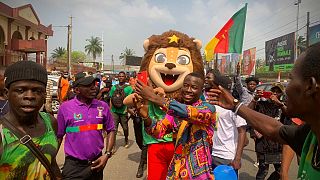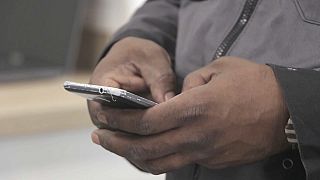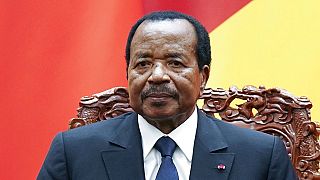Cameroon
The scribbled lines, the imperfect pencil strokes... the Cameroonian Félix Fokoua flips through his first drawing book with nostalgia. Today, his electronic tablet and his computer have become the indispensable tools for the exercise of his art.
At 29, crowned with several international awards, he has broken through in Cameroon, where he designed the mascot for the next African Cup of Nations (CAN) soccer tournament to be held in January 2022 in his country, and is starting to make a name for himself abroad.
"This would not have been possible without digital technology," he told AFP. Many young Cameroonian artists interviewed say the tool has helped them launch themselves professionally and broadened their worldview.
"When I was young, I was passionate about comics. I loved to draw. But I couldn't imagine making this passion my profession," says Felix Fokoua. He graduated with a degree in biochemistry and, when his mother opened an Internet café, he joined Facebook and avidly followed groups of French, American and Japanese artists, his first sources of inspiration.
Then he began to take an interest in creation in his country. He draws, progresses, contacts creators. No question yet of using tablets, they are almost unobtainable and very expensive in Cameroon in the early 2010s.
- Create to entertain -
It is through an uncle in France that he gets one. Quickly, he is recruited by Kiro'o Games, the first video game studio in Cameroon, just created. Felix learns to use his mouse and his imagination to create new settings and characters.
Then he started his own business and began to work in digital illustration, "with the idea of promoting African culture". "When I started, I was always told to go to the NGOs, to explain malaria, AIDS, it annoyed me! I wanted above all to entertain," he explains.
Félix Fokoua exhibits his works on the web, mainly on Facebook and Instagram. He receives private commissions, mostly from abroad.
He also creates a series of digital "stickers" representing Cameroonian culture for Whatsapp and Telegram instant messengers. Gradually, his network is growing, his earnings are increasing and large African companies such as the telecommunications groups MTN and Camtel, or the online shopping platform Jumia, call on him.
"In Africa, artists have everything to create with new rules, a world to reinvent, a new culture to develop," he enthuses.
For Nicanor Tatchim, a teacher-researcher at the University of Lille (France), "a new economic model is emerging" with "new digitalized practices of production, distribution and "publicization" of content.
However, "the authorities in Cameroon have included the digital in the field of industrial development" to the detriment of the cultural industry, said Tatchim. "The proof: the issue of digital innovation is carried by the Ministry of Posts and Telecommunications and not the Ministry of Arts and Culture.
- Promising future -
Hugues Bertrand Biboum, artistic director of Waanda Stoudio, a graphic design and publishing studio in Yaoundé, admits that "the transformation of the sector is very favorable" and that "international demand is increasing" for African digital products. But he also laments the lack of interest and support from the government.
"The future of the sector is promising," says Olivier Madiba, founder and director of Kiro'o Games, based in the capital. "But Cameroon has a huge technical and human backlog to make works that meet the requirements of the viewer."
"Netflix or Disney realize that the future of streaming expansion is in Africa. So it's in their interest to have content targeted to the local audience. But we will have to be able to deliver the quality that these companies demand," Madiba argues.
"Digital and creativity are the key words of the future, especially in Africa, which is beginning its phase of economic development," agrees Mr. Tatchim.
However, Cameroon, led by the irremovable Paul Biya, 88 years old with nearly 39 years in power, "is caught between the injunctions to digitize the economy from the institutions and the socio-political realities" of the country, according to him.
In 2017, the authorities had notably cut the internet for several months in the English-speaking regions of Cameroon, which are home to many digital start-ups, to contain the separatist crisis that has degenerated into a conflict that has claimed more than 3,500 lives in the last four years.












Go to video
Digital exhibition brings story of ancient Egypt's King Tut to life
Go to video
Apple soon to be valued at $4 trillion on the stock market
01:00
Superhero battles in Argentina
Go to video
Tanzania suspends media company's online platforms for 30 Days
02:18
"Capital City Comic Con", a vision for Nigerian cartoons
00:59
China and 26 African countries agree to strengthen partnerships in digital field